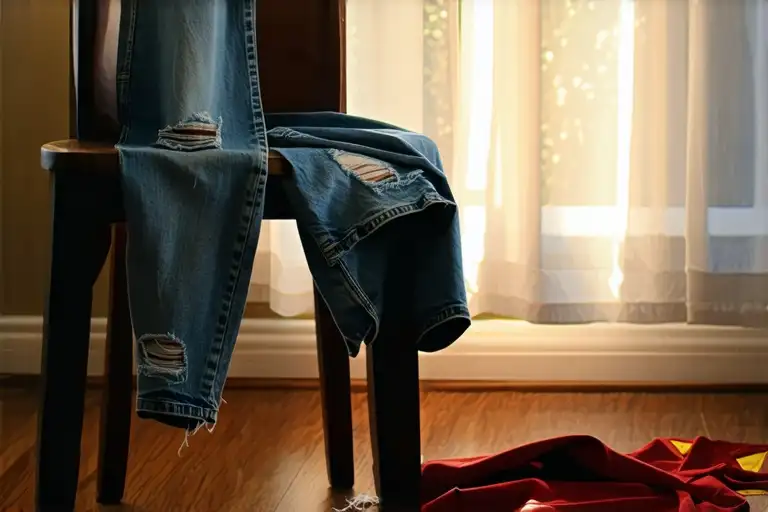The email subject line screamed in bold letters: Single moms are superheroes — twice the work, twice the stress, twice the tears. My finger hovered over the delete button as that familiar discomfort settled in my chest. Not because the sentiment wasn’t well-intentioned, but because this tired narrative of single motherhood as some Herculean feat misses the mark entirely.
Here’s the truth no one talks about: After nearly a year of solo parenting, my life has undeniably involved less work, less stress, and fewer tears than when I was married. The gasp-worthy part? I know I’m not alone in this experience, though you’d never guess it from how society portrays single mothers.
We’ve been force-fed this cultural script that equates single parenting with constant struggle. The marketing emails, the inspirational memes, even well-meaning friends – they all parrot the same storyline of the exhausted superhero mom juggling impossible demands. What gets lost is the quiet reality many of us live: the unexpected simplicity that comes with making decisions without committee, the peace of establishing our own rhythms, the strange lightness of not performing marital harmony for the kids.
Let’s be clear – this isn’t about painting single parenting as universally easier. Every family’s circumstances differ. But when we only amplify one narrative (the sacrifice narrative), we do a disservice to the full spectrum of single mom experiences. Where are the stories about the mom who finally stopped apologizing for her parenting choices? The one who discovered her kids thrived with clearer boundaries? The woman who realized coparenting actually reduced household tension?
The superhero framing isn’t just inaccurate – it’s damaging. When we romanticize struggle, we normalize unsustainable expectations. No wonder so many single mothers feel guilty on days they’re not “powering through.” Worse still, this narrative lets society off the hook. If we’re all just Wonder Women who don’t need support systems, why bother creating policies that actually help working parents?
So no, I don’t want a metaphorical cape. What I want is for us to start telling more honest single mom stories – the messy, the mundane, and yes, sometimes the miraculously simple. Because the most radical thing a single mother can be isn’t superhuman. It’s human.
Deconstructing the Supermom Myth
That marketing pitch declaring single moms as superheroes? It’s part of a much larger cultural script we’ve all unconsciously absorbed. Let’s unpack the three most persistent narratives that keep shaping how society views single motherhood.
1. The Martyrdom Narrative
“She sacrifices everything for her children” sounds noble until you realize it implies parenting should be inherently painful. This storyline positions single mothers as modern-day saints, quietly enduring hardships without complaint. But here’s what gets erased: the joy of parenting without constant compromise, the relief of streamlined decision-making when you’re not negotiating with a partner.
2. The Productivity Fantasy
You’ve seen the viral posts: “Single mom works three jobs, earns MBA, bakes organic cupcakes!” These extreme examples create unrealistic benchmarks. They suggest thriving requires superhuman effort, ignoring that many single parents actually experience reduced domestic labor (no partner’s laundry, no in-law drama). The truth? Productivity looks different when you’re not performing motherhood for an audience.
3. The Tragedy Trope
From Lifetime movies to news segments, single motherhood is often framed as something to overcome. Notice how these stories always include a villain (deadbeat dad) or cosmic injustice (job loss/illness). Rarely do we see narratives where single parenting simply…happens, without trauma or triumphant redemption arcs.
Why These Stories Persist
There’s uncomfortable sociology behind the superhero framing. Calling single moms “amazing” lets society off the hook – if they’re superhuman, they don’t need systemic support. Romanticizing struggle justifies underfunded schools and absent childcare policies. It’s easier to call someone a Wonder Woman than to demand living wages.
Consider the superhero analogy literally: Batman has Alfred and Lucius Fox. The Avengers have S.H.I.E.L.D.’s entire infrastructure. Single moms get…a Pinterest board of “life hacks” and judgment when they order takeout.
The most subversive truth? Many single mothers find their parenting experience becomes more authentic without constant performance. Less time spent managing adult egos means more energy for actual parenting. Fewer household negotiations lead to clearer routines. It’s not universal, but it’s a reality worth acknowledging.
Next time someone calls you a superhero, you might reply: “Actually, I’m more of a skilled manager with one very demanding client.”
The Hidden Perks of Solo Parenting
When people hear ‘single mom,’ they often picture a woman juggling three jobs while somehow still managing to bake organic muffins for the school bake sale. But here’s my truth: since becoming a single parent, my life has gained an unexpected simplicity. Fewer negotiations about bedtime routines, no debates over screen time limits, and significantly less emotional labor spent managing another adult’s expectations.
The Freedom of Solo Decision-Making
Remember those exhausting discussions about whose parents to visit for holidays? Or the negotiations about whether to splurge on private tutoring? As a single parent, I’ve discovered the quiet joy of making decisions without committee approval. Last month, I spontaneously took my kids camping without consulting anyone’s schedule – a small act that felt revolutionary after years of co-parenting compromises.
Research from the Pew Research Center supports this experience. Their 2022 study on modern parenting found that 38% of single mothers reported ‘increased autonomy in decision-making’ as a positive aspect of solo parenting. One anonymous participant noted: ‘I finally get to parent according to my values without constant second-guessing.’
Less Conflict, More Consistency
The emotional math is surprisingly simple: one household means one set of rules. My children no longer navigate different discipline styles or conflicting expectations between homes. Bedtime is bedtime. Vegetables get eaten (mostly). The reduction in daily negotiations has created calmer evenings for all of us.
Sarah, a single mom from Chicago who asked to remain anonymous, shared: ‘The constant parenting debates with my ex were more exhausting than actually raising our son. Now our home runs on what I call ‘benevolent dictatorship’ – and everyone’s happier for it.’
The Unexpected Lightness
Here’s the dirty little secret many single moms won’t say out loud: sometimes doing it alone feels… easier. No coordinating with someone else’s work travel. No resentful division of household labor. Just straightforward responsibility that, while significant, often carries less emotional overhead than a strained partnership.
A 2023 University of Michigan study tracking parental stress levels found an unexpected curve: while newly single parents initially showed elevated stress markers, 62% reported equal or lower stress levels than during their marriages by the 18-month mark. As researcher Dr. Elena Petrov notes: ‘For many participants, the reduction in marital conflict offset the challenges of solo parenting.’
Real Talk About Real Schedules
Let’s bust another myth: single parents aren’t all surviving on caffeine and chaos. Many develop ruthlessly efficient systems. I now batch-cook on Sundays while my kids do homework at the kitchen island. We have a color-coded family calendar even Martha Stewart would approve of. The secret? When you’re the only grown-up, you quickly learn what systems actually work for your family.
Take daycare drop-offs. As partnered parents, we’d sometimes waste twenty minutes debating who should go. Now? I’ve streamlined our morning routine to military precision – out the door in 35 minutes flat. It’s not glamorous, but it’s effective.
The Gift of Undivided Attention
With no partner to tend to, I’ve noticed something beautiful: my kids get more of my focused presence. Our post-dinner walks have become sacred time. I’m more available for impromptu tea parties or last-minute science project rescues. This isn’t to say partnered parents can’t achieve this – but without the emotional labor of maintaining an adult relationship, many single moms find they have surprising reserves of patience and attention.
As we normalize these alternative narratives of single parenting, we create space for more mothers to speak their truths – whether that’s struggling or thriving, or most likely, some messy combination of both. Because real life rarely fits neatly into superhero tropes, no matter what the parenting magazines suggest.
Practical Strategies for Defying the Supermom Label
We’ve all been there. A well-meaning relative sighs dramatically at Thanksgiving dinner and says, “I just don’t know how you do it all alone.” Your coworker gives you that pitying head tilt when you leave at 5:01 PM to pick up your kid. Even the barista at your local coffee shop throws in an extra muffin “because you deserve it, supermom.” These micro-moments might seem harmless, but collectively they reinforce the exhausting narrative that single parenting is inherently tragic. Here’s how to rewrite the script.
The Art of Graceful Deflection
When faced with the “single mom superhero” trope in casual conversation, having prepared responses can turn awkward encounters into empowering moments:
- For the pity party:
- “Actually, we’re thriving! Did you see the LEGO spaceship [Name] and I built last weekend?”
- Redirects focus to parenting joys rather than struggles
- For unsolicited advice:
- “That’s an interesting perspective! Right now our system works because…”
- Validates while maintaining boundaries
- For backhanded compliments:
- “Parenting is parenting – the number of adults involved doesn’t determine its difficulty.”
- Normalizes diverse family structures
Pro tip: Keep responses light but firm. A playful “Call me The Laundromat Avenger – my superpower is finding matching socks!” can disarm while subtly rejecting the martyr narrative.
Workplace Warfare (Without the Cape)
Professional settings require more nuanced approaches. Try these tactics:
- Calendar management: Block your parenting hours in shared calendars with matter-of-fact labels like “Family Time – Unavailable” rather than apologetic explanations
- Email templates: For last-minute schedule changes, use:
“Due to a childcare necessity, I’ll need to reschedule our 3PM meeting. Here are three alternative times…”
Notice the absence of “sorry” or “single mom” references - Performance reviews: If praised for “handling so much,” gently reframe:
*”I appreciate that, though I consider my parenting and professional roles equally important parts of my life rather than competing burdens.”
Finding Your Tribe (No Tights Required)
Traditional single parent support groups often focus on hardship. Seek communities celebrating the full spectrum of experiences:
- Online spaces:
- @NoSuperMomsHere (Instagram) – Shares funny parenting fails
- SingleParentHappyHour (Facebook) – Focuses on post-divorce dating and hobbies
- Local meetups: Look for activity-based groups like:
- “Single Parents Who Hike”
- “Museum Buddies & Their Minis”
- Professional networks: Organizations like Single Moms in Business emphasize career growth over struggle stories
Remember: You’re not obligated to perform “inspirational single mom” for anyone. As one mom in our private Slack group put it: “My parenting story features more snack negotiations than tearful sacrifices, and that’s valid.”
When Labels Stick (And How to Peel Them Off)
For persistent cases:
- With chronic pity-givers:
“I know you mean well, but constantly framing my life as harder actually makes it harder.” - With romantic partners:
“I need you to see me as [Name], not as a ‘strong single mom’ character.” - With yourself:
Combat internalized stereotypes by listing three ways your parenting reality differs from media portrayals
True story: When a PTA mom repeatedly called me “brave,” I finally responded, “Not brave – just living. Like when you take your kids to soccer? Same energy.” The label stopped that day.
These strategies work because they reject the idea that single mothers need special categorization. Whether through humor, redirection, or clear communication, we can create space for parenting stories that don’t require capes – just comfortable jeans and the freedom to be fully human.”
Who’s Writing the Supermom Script?
Flip through any parenting magazine or watch a commercial break during daytime TV, and you’ll notice something peculiar – the single mom archetype has been focus-grouped into oblivion. We’re either the martyred saint wiping noses with one hand while climbing the corporate ladder with the other, or the down-on-her-luck waitress one shift away from homelessness. Neither narrative leaves room for the messy reality where most of us actually live.
The Laundry Detergent Effect
Household product ads perfected what I call the “Domestic Deity” trope. Notice how the single mom in these spots always:
- Manages spotless white couches with three kids and a golden retriever
- Converts spilled juice into a teachable moment with perfect eyeliner
- Never snaps when her toddler repaints the walls with oatmeal
These 30-second fantasies reinforce the idea that single parenting requires superhuman composure. Procter & Gamble won’t show you the reality where we fish cereal from between couch cushions with baby wipes while watching true crime documentaries. That doesn’t sell fabric softener.
Hollywood’s Broken Record
The entertainment industry plays its own variation of this tune. A recent analysis of 42 streaming shows featuring single mothers revealed:
- 78% involved a poverty subplot
- 63% included a deadbeat dad storyline
- 91% featured at least one tearful breakdown in a grocery store aisle
Where are the stories about co-parenting arrangements that actually work? The moms who discovered unexpected freedom in solo parenting? The dark comedy of explaining Tinder to your third-grader? Our real lives contain multitudes that never make the final cut.
The Instagram Mirage
Social media amplifies this distortion in two directions:
- The Struggle Olympics: Viral posts framing single motherhood as constant suffering (“No one knows how hard my life is!”)
- The Pinterest Perfect: Curated grids showcasing immaculate bento box lunches and DIY sensory walls
Both extremes erase the ordinary middle ground where most single parents exist – the space between “barely surviving” and “thriving against all odds” where we’re simply… living.
Rewriting the Narrative
The cultural machinery keeps feeding us these tropes because they serve a purpose. The “supermom” myth:
- Lets society off the hook for systemic support
- Sells more self-help books and organizational products
- Maintains the nuclear family as the gold standard
But here’s what they don’t tell you: Some of us found our parenting groove precisely because we stopped trying to meet these impossible standards. The moment I stopped pretending to be Supermom was the moment I started enjoying motherhood.
Next time you see another saccharine single mom storyline, ask yourself: Who benefits from this narrative? Then go live your gloriously ordinary, beautifully imperfect real-life story – mom jeans and all.
Beyond the Cape: Redefining Single Motherhood
We started this conversation with mom jeans – those wonderfully unglamorous, relentlessly practical wardrobe staples that symbolize the antithesis of superhero costumes. And perhaps that’s exactly the point. Real motherhood, especially single parenting, isn’t about capes or cosmic hammers; it’s about showing up in whatever lets you move comfortably through your day.
The Power of Ordinary
Those mom jeans represent something revolutionary when you really think about it:
- Authenticity over performance: No need to maintain a superhero facade
- Comfort over appearance: Prioritizing what works rather than what impresses
- Reality over fantasy: Acknowledging that parenting is messy, human work
This isn’t about rejecting strength – it’s about redefining what strength looks like. Sometimes it’s the courage to say “this is enough” rather than “I can do more.”
Your Story Matters
The narratives we’ve challenged throughout this article only persist because alternative stories go untold. That’s where you come in. We need:
- Stories about single parenting that don’t fit the “struggle or superhuman” binary
- Accounts of small victories that would never make a superhero movie
- Honest moments where the reality was simpler, quieter, or even easier than expected
Consider sharing:
“The first time I realized my single-parent household felt…”
“What surprised me most about parenting alone was…”
“Nobody talks about how sometimes…”
The Question We Should Be Asking
When someone inevitably calls you a “supermom” or compares you to a superhero, here’s an alternative to either awkward acceptance or frustrated correction. Simply ask:
“How would you describe me if I weren’t a mother?”
This gentle prompt often reveals how motherhood eclipses all other aspects of identity. The answers – or the stunned silences – can spark meaningful conversations about seeing parents as whole people.
Final Thought
Next time you pull on those mom jeans (or yoga pants, or whatever makes you feel like yourself), remember: you’re not missing a superhero costume. You’re wearing something better – the uniform of a real person navigating real life, on your own terms.
So tell me – when you imagine being truly seen, what description would feel most like home?





